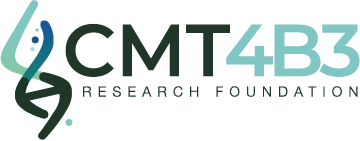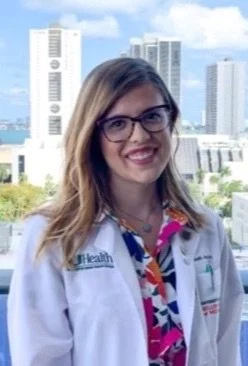
RESEARCH PROGRAM
CMT4B3 RESEARCH NETWORK
We have built a global Collaborative Research Network to accelerate breakthroughs in Charcot-Marie-Tooth Disease Type 4B3 (CMT4B3) and related neuromuscular diseases. Our researchers work together across the world, breaking down barriers to discovery by openly sharing their findings. This collaborative environment helps speed up research, leading to more breakthroughs and bringing us closer to treatments and cures for patients.
RESEARCH PROJECTS
We fund projects that aim to slow, stop, or reverse CMT4B3 and related neuromuscular diseases.
100% of donations support CMT4B3 research.
Dr. Robert Burgess
Jackson Laboratory
Recharacterize Mouse Model / Gene Therapy Testing
Grant Amount: $52,871 | Project Length: 1 Year
Dr. Burgess at Jackson Lab is rederiving and recharacterizing the CMT4B3 mouse model and testing gene therapy effectiveness. His work helps understand the molecular mechanisms at play in neuromuscular disorders, driving forward gene therapy solutions.
The Burgess lab seeks to understand the molecular mechanisms of synapse formation and maintenance at two sites in the nervous system: the peripheral neuromuscular junction and the retina. In all of these studies, they are addressing basic molecular mechanisms which have relevance to human neuromuscular and neurodevelopmental disorders. Their continued research on the genetics underlying these disorders, and their continuing efforts to identify new genes involved in these processes, will increase the understanding of the molecules required to form and maintain synaptic connectivity in the nervous system.
Dr. Jason Chua Johns Hopkins University
“Discovering the cell type-specific biology of MTMR5 using a novel iPSC-derived model system of CMT4B3”
Grant Amount: $200,000 | Project Length: 2 Years
Dr. Chua will create human cellular models using CRISPR and test FDA-approved drugs on them. His research focuses on autophagy, a key process in cells, which may provide new treatment strategies for neurodegenerative diseases like CMT4B3.
Dr. Chua’s primary research interests are in neurodegenerative disease with a special focus on autophagy — an essential housekeeping process in cells that is particularly important for the health of neurons. Autophagy may provide a way to break down the buildup of toxic proteins found in neurodegenerative diseases, thereby forming the basis of new treatment strategies for these incurable conditions.
Dr. Jim Dowling
SickKids Hospital
CMT4B3 Zebrafish Development
Grant Amount: $25,153 | Project Length: 1 Year
Dr. Dowling is developing a CMT4B3 zebrafish model using CRISPR/Cas9 to mimic the disease and identify phenotypes suitable for drug screening. His work focuses on discovering therapies for childhood muscle diseases.
The overall goal of Dowling's research program is to discover therapies for childhood muscle diseases. He is particularly focused on muscle disorders that present in infancy, including the congenital myopathies and the congenital muscular dystrophies. Dowling utilizes a combinatorial approach that includes new gene discovery (using next generation sequencing technology), model organism development (particularly using the zebrafish model system) and both targeted, and large scale screening drug discovery approaches. He complements this work with cutting edge rare disease clinical research related to natural history, outcome measure development, and interventional trials.
Dr. Jefferson Doyle
John Hopkins
CMT4B3 Motor Neurons / Small Molecule Research
Grant Amount: TBD | Project Length: 1 Year
Dr. Doyle will study the eyes of CMT4B3 knockout mice to evaluate progression and test treatments for myopia and retinal degeneration. His research seeks to develop new therapeutic strategies for genetic eye diseases.
Jefferson Doyle, specializes in pediatric ophthalmology and genetic eye diseases. Dr. Doyle has published extensively on a number of genetic disorders over the past decade, holds several patents for novel therapeutic approaches to treat them. Dr. Doyle's main research focus is understanding the genetic causes and molecular mechanisms driving genetic diseases, and utilizing that knowledge to develop new therapeutic strategies for them.
Dr. Scott Harper
Nationwide Children's Hospital
Gene Therapy - Split Vector
Grant Amount: $124,927 | Project Length: 1 Year
Dr. Harper is developing a split-vector AAV system to deliver the large SBF1 gene to neurons. This innovative approach could help overcome the size limitations of current gene therapy vectors, pushing us closer to a gene therapy solution for CMT4B3.
The Harper Lab is focused on developing RNAi-based treatments for dominantly inherited neuromuscular disorders. It uses a broad range of tools, including molecular techniques, biochemistry, viral vectors, and mouse models of disease.
Professor Henry Houlden
UCL Institute of Neurology
Natural History Study of CMT4B3 Patients
Grant Amount: $63,818 | Project Length: 18 months
Professor Houlden is studying clinical features and MRI scans of CMT4B3 patients to better understand disease progression. This knowledge will guide future therapeutic strategies.
Professor Houlden’s lab works on the genetics of neurodegeneration, peripheral nerve disease, ataxias, and paroxysmal movement disorders. The combination of genetic, functional cell biology and neuropathological methods is a particularly powerful approach for understanding neurological diseases and their pathological processes. His research group is carrying out a program of genetic and pathological investigations into human neurodegeneration. These genetic and neuropathological studies which integrate functional in vitro research, will translate into disease modifying treatments for human diseases.
Dr. Mario Saporta
University of Miami
Developing Human Platforms for Therapy Development for CMT4B3
Grant Amount: $250,960 | Project Length: 2 years
Dr. Saporta is using CMT4B3 iPSC lines to study disease symptoms and create models of motor neurons and sensory cells. His groundbreaking work could lead to small molecule therapies for CMT4B3.
Dr Saporta has spent the last five years developing human in vitro cellular models to study axonal phenotypes in inherited peripheral neuropathies (Charcot-Marie-Tooth Disease, CMT). CMT are a group of genetic neurodegenerative diseases caused by mutations in distinct genes that play fundamental roles in the physiology of peripheral nerves. He has identified abnormal distribution in the axons of human CMT2E/NEFL motor neurons as a cellular phenotype in CMT2E. He has used this model to investigate small molecules that could reverse this axonal phenotype. He will apply this groundbreaking work to CMT4B3.
Dr. Stephan Zuchner
University of Miami
Gene Therapy - MiniGene
Grant Amount: $208,050 | Project Length: 2 Year
Dr. Stephan Zuchner is designing a smaller version of the SBF1 gene to fit into the AAV9 vector. This engineered minigene will be tested for its ability to replicate the main functions of the full gene and potentially treat CMT4B3.
Dr. Zuchner is a trained neurologist and molecular geneticist with research interests in identifying genetic variation associated with disease. He has spearheaded the Inherited Neuropathies Consortium (INC) His lab has identified several genes for Mendelian neurodegenerative disorders and also evaluated risk factors for complex genetic conditions, including Alzheimer disease, Parkinson disease, and obsessive-compulsive disorder. His lab is amongst the pioneering groups that have promoted genome sequencing methods for disease gene identification in humans, mice, and drosophila.
Generating iPSC Lines & Edited iPSC Lines
Cost: $29,177 | Project Length: 1 year
We’ve partnered with Sampled to generate iPSCs and corrected iPSC lines using CRISPR technology. These stem cells provide an unlimited source of human cells for research, testing drugs, and learning more about disease mechanisms.















